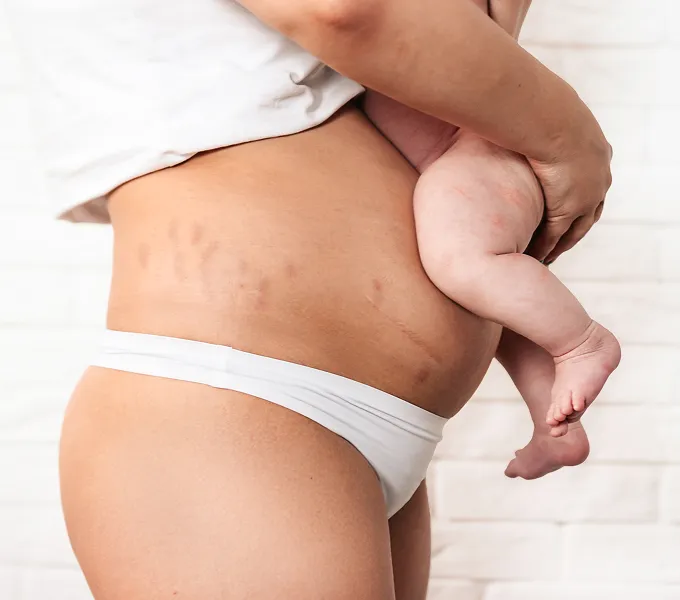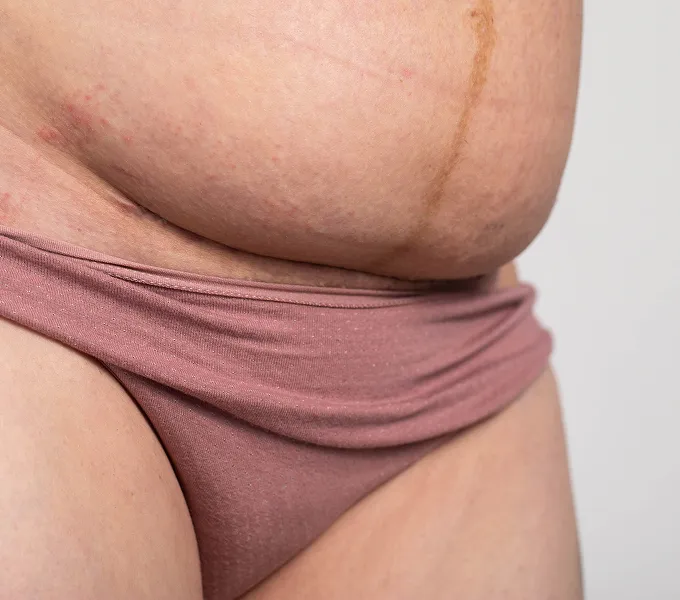
Treating Pain Can Boost Your Postpartum Mental Health
If you're one of many birthing people who were shocked to discover that the fourth trimester can be more uncomfortable and painful than the first three, we are here for you. Yes, the day will come when you feel like yourself again and can move your body with total confidence. To make sure it comes sooner rather than later, it's important to make treating your pain a priority. We know that can be hard to do when you have a baby to care for, which is why we wanted to create this post explaining the toll that pain can take — not just on your body, but also your mental health.
Read on to learn what to expect pain-wise in the postpartum period, how deeply pain and mental health are related, and why postpartum physical therapists can be an amazing resource in the days, months, and years ahead.
Postpartum Pain: When Everything Hurts
As anyone that has gone through it knows, pregnancy and childbirth are wildly intense, physiological processes that can leave you vulnerable to all sorts of pain and injury. In fact, as many as 79% of people who have cesarean births (C-sections) and 48% of people who have vaginal births report experiencing postpartum pain.
79% of people who have cesarean births (C-sections) and 48% of people who have vaginal births report postpartum pain.
According to the American College of Obstetricians and Gynecologists (ACOG), it is common to have early postpartum pain that includes:
- Cramping
- Pain in the back, neck, or joints
- Pain in the perineum (the area between the vagina and the anus)
- Pain around the cesarean incision (for those who had a C-section)
- Swollen breasts/chests
- Hemorrhoids
These painful symptoms may be scary, but they can typically be eased with at-home pain management strategies (more on that below), and resolve in a matter of days or weeks. What isn't typical is for pain to persist and stick around for several months or even longer after childbirth. Addressing lingering postpartum pain quickly is critical since it's often a sign of more significant physical injury or dysfunction that requires the care of a specialist.
Addressing lingering postpartum pain quickly is critical.
For example, persistent postpartum pelvic pain is often the result of dysfunction in the pelvic floor muscles, which stabilize the pelvis as well as support bowel, bladder, and sexual functioning.
“While your body has an amazing ability to adapt, the strain of pregnancy and childbirth pushes your abdominal and pelvic floor muscles to the limit. Without rehabilitation, they often remain weak, tight, and/or uncoordinated,” says Origin physical therapist and clinical content specialist Dr. Ashley Rawlins, PT, DPT. “It’s no wonder that 58% of individuals who gave birth vaginally and 43% of those who had a cesarean birth report symptoms of pelvic floor dysfunction (think: incontinence, prolapse, and painful sex), while 1 in 3 still struggles with diastasis recti abdominis (DRA) one year after childbirth.”
Outside of physical injury and muscle dysfunction, postpartum pain can also be connected to the emotional vulnerabilities and mental health adjustments that are so common in the fourth trimester.
Postpartum Mental Health — Beyond the Blues
Unfortunately, the reality is that most birthing people will experience “baby blues” due to hormonal changes after giving birth, up to 15% of pregnant and postpartum people develop significant symptoms of anxiety or depression. Studies show that 5% continue to have depressive symptoms three years postpartum.
Without treatment, postpartum mood and anxiety disorders can impact your:
- Overall health and wellbeing
- Ability to bond with your baby
- Relationship with your partner
- Child’s long-term health and development
It's important to note that postpartum mental health issues are even more commonly reported among Black and Indigenous people than they are among their white and Latine counterparts. Exacerbating the problem for Black people, in particular, is the reality that depression can look different among Black people — and Black people are less likely to get mental healthcare in the postpartum period.
The Postpartum Pain & Mental Health Connection
A growing body of research demonstrates a strong link between postpartum pain and postpartum mental health issues. The upshot: People who report postpartum pain are more likely to experience depressive symptoms.
In one 2008 study that examined data from 1,288 postpartum people, those who had severe and acute postpartum pain were three times more likely to have depression than those who had mild postpartum pain. A 2020 study affirmed that pain during and after childbirth were both associated with postpartum depressive symptoms.
In a 2018 study in which the charts of patients at a specialty postpartum perineal clinic were reviewed, the researchers identified an association between postpartum pelvic floor symptoms and postpartum depression: People who were referred to the clinic for painful pelvic floor-related symptoms were more likely to have postpartum depressive symptoms. Patients who had a history of depression or anxiety, as well as nonwhite patients, were also more likely to have postpartum depressive symptoms.
People who were referred to the clinic for painful pelvic floor-related symptoms were more likely to have postpartum depressive symptoms.
Some researchers have suggested a bidirectional relationship between postpartum physical health and mental health. As the authors of a 2014 study on the subject wrote in their commentary, “Women with physical problems are more likely to be depressed, but being depressed may also make them more aware of their physical discomfort, delay help-seeking, and disengage them from treatment.”
Unsurprisingly, pain is under-evaluated and undertreated in people of color. In one 2019 study among people who gave birth via C-section, people of color reported higher pain scores, had fewer pain assessments, and received less pain medication while recovering. Considering the fact that people of color are also more likely to have postpartum mental health issues, these findings suggest that postpartum pain and mental health may be especially difficult in this group.
How to Treat Early Postpartum Aches & Pains
If you're just days or weeks postpartum and are experiencing common sources of pain, there are many ACOG approved ways to find support and get relief.
Tips for managing cramping and “afterpains”
- Using a heating pad
- Taking ibuprofen
Tips for managing back, neck, or joints pain
- Using a heating pad
- Taking ibuprofen or other over-the-counter pain medications
- Avoiding bending your wrists too much
- Experimenting with different breastfeeding/chestfeeding positions (like looking up instead of straining your neck)
Tips for treating pain from perineal tears
- Using an ice pack or cold gel pack for 10-20 minutes at a time in the 24-72 hours after giving birth
- Applying witch-hazel to the perineal area
- Taking ibuprofen
- Sitting on a pillow or cushion
- Doing a sitz bath
- Cleaning the genitals with a squeeze bottle filled with warm water
- Breastfeeding/chestfeeding on your side
- Getting a numbing spray or cream from your doctor
- Taking a stool softener
Tips for managing pain around the cesarean incision
- Pain medication as recommended/prescribed by your healthcare provider
- Using a heating pad
- Using a belly binder
- Trying alternative breastfeeding/chestfeeding positions that take pressure off the incision
Tips for managing pain from engorged breasts/chest
- Breastfeeding/chestfeeding more often to relieve pressure (if you’re nursing)
- Using a cold pack
- Wearing a properly-fitted bra
Tips for treating hemorrhoid pain
- Using medicated sprays and/or topical ointments
- Dry heat (like a hairdryer on low)
- Doing a sitz bath
- Using cold witch-hazel compresses
- Using a stool softener if needed
Treating Postpartum Depression & Anxiety
The standard treatment for postpartum mental health challenges is psychotherapy, medication, or a combination of the two. Your healthcare provider (and even your pelvic floor physical therapist) can refer you to specialists if you need them.
There are also non-clinical options that have been demonstrated as effective for helping with mental health in the postpartum period, including:
- Bright light therapy
- Building your support system
- Nutritious meals
- Quality sleep
- Regular exercise
- Relaxation techniques
- Yoga
Postpartum Support International also offers in-person and online support groups, as well as other mental health resources, for people who are postpartum.
Mental health screeners with healthcare providers don’t always catch all postpartum mental health issues, so try to be open and honest with the people around you if you’re having trouble. New parenthood can be a struggle, but you deserve support.
Don't Wait to See a Postpartum PT
Postpartum people can begin pelvic floor physical therapy as soon as they return from the hospital. Pelvic floor physical therapists are experts in the pelvic floor region and have the know-how necessary to assist you in safely and gently reconnecting with your body and achieving whole-body healing after having a baby.
Since many of the causes of postpartum pain are related to the pelvic floor and abdominal muscles, working with a pelvic floor physical therapist can help you restore strength, regain mobility, and rehabilitate the muscles engaged in pregnancy, vaginal birth, and C-section. If you’re dealing with bowel and bladder control in addition to postpartum pain, pelvic floor physical therapy is an effective way to get support.
For people who’ve had C-section births, pelvic floor physical therapists are skilled at promoting post-surgery healing and recovery. They offer a range of evidence-based techniques to aid the process of healing, including scar tissue massage, cupping, heat, gentle exercise, and dry needling (when available and helpful).
Pelvic floor physical therapists also provide invaluable education and emotional support while you’re healing. Knowing what’s happening with your body and why will help you feel more agency in your recovery process—a time when everything can seem very much out of your control. In fact, pelvic floor education may even reduce the psychological distress that can come from experiencing symptoms of pelvic floor dysfunction.
Pelvic floor physical therapists provide invaluable education and emotional support while you’re healing.
“The postpartum experience can be isolating in a lot of ways,” Rawlins told us. “It’s not uncommon to feel like an unrecognizable version of yourself: exhausted, tired, confused, disappointed/traumatized in your birth experience … and suddenly dealing with pelvic symptoms you never imagined would impact you.” Pelvic floor physical therapy can help.
Pelvic floor physical therapists will also check in with how you’re feeling mental health-wise and connect you with additional support when needed. Physical therapy itself has even been linked to improving mental health in the postpartum period. In one study, after attending a physical therapist-led program offering specialized exercises and parenting education, participants who were “at risk” for depression had a 50% reduction in risk factors for postpartum depression.
Don't hesitate to book a postpartum visit with an Origin PT — our team of trauma-informed and knowledgeable pelvic floor physical therapists can help you prepare your body for, and recover from, the impact of pregnancy and childbirth. At a time when so much is changing, you can trust our experts to guide you through your mind-body healing.




